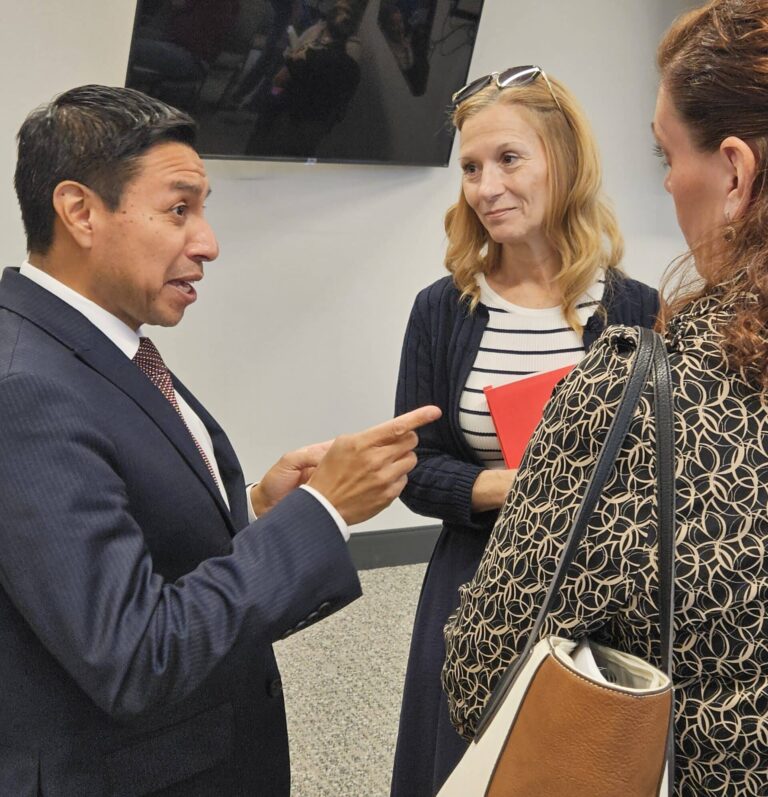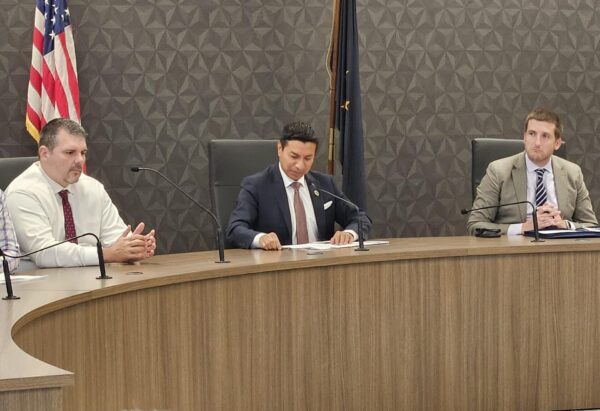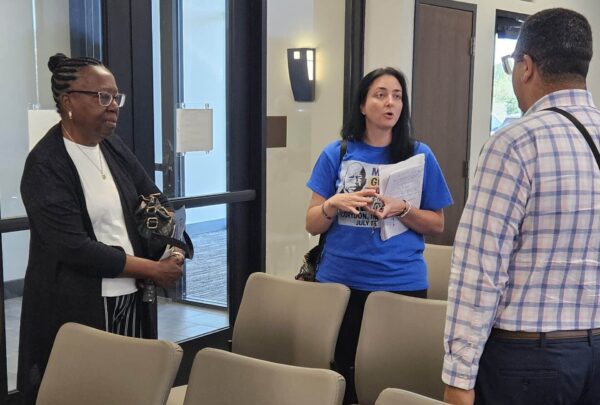
By Marilyn Odendahl
The Indiana Citizen
September 22, 2025
JEFFERSONVILLE – At the Indiana Secretary of State’s election study meeting in Jeffersonville on Friday, the politically diverse crowd of private citizens, county clerks and local elected officials were all in agreement about one thing regarding moving municipal elections and using vote centers – let the local communities decide.
“It should be up to the county and to the election administrators,” Washington County Circuit Court Clerk Stephanie Rockey said, echoing the comments of many at the meeting. “I was elected Republican, but when it comes to … my fellow clerks, we live and breathe our elections. It’s not about the party. It’s about the process. So you need to leave it up to our counties, we represent our voters.”
This was the third meeting Indiana Secretary of State Diego Morales has held since August to present voting-related data and take public comment on the potential for shifting municipal elections from odd-numbered to even-numbered years, so they would coincide with mid-term and presidential elections, and for requiring all counties in the state to use voting centers rather than precincts, on Election Day. Just as he was at the previous meetings in Muncie and Indianapolis, Morales was joined at the Clark County Government Center by officials from his office and experts from the Voting System Technical Oversight Program at Ball State University who presented detailed analyses of the data they had collected on the two topics.
Reaction from audience members who spoke about voting centers was mixed with those opposed raising concerns about where the centers would be located, whether they would be accessible to all members of the community and how long voters would have to wait in line to cast their ballots. Conversely, all the speakers were unanimously opposed to rescheduling municipal elections. Primarily, they cited concerns that local issues and local candidates would not be heard among the din of a general election when having to run alongside presidential and congressional candidates.
Charlestown Mayor Treva Hodges, a Democrat, told Morales that she and members of the common council and the city clerk-treasurer, all of whom are Republicans, are all opposed to moving municipal elections to even-numbered years. She noted national campaigns focus on topics of national importance like the economy, immigration, foreign policy and health care, while local elections focus on community matters, such as pothole repair and snow removal.
“What we know will happen with the amount of money that is funneled in through federal elections is that the local voice, the local option and the local concerns will get flooded out in those elections,” Hodges said. “That is unfair, that removes local control and it separates people locally from the day-to-day matters that affect their lives.”
Some at the Jeffersonville meeting were upset that they could not provide input on redistricting. Currently, state GOP lawmakers are considering an unprecedented mid-decade redrawing of Indiana’s congressional districts to give Republican candidates an advantage in the 2026 mid-term election.
Members in the audience asked why Morales and the officials were not talking about what they called the “elephant in the room.”
Morales explained the Indiana General Assembly mandated the election study and set the parameters in House Enrolled Act 1633, which was passed during the 2025 legislative session. The law requires the secretary of state to hold at least three meetings to gather public input on only the topics of moving municipal elections and using voting centers.
“Our job right now is to come here and listen, get all the information and then put this in the report and submit it to the General Assembly,” Morales explained to the crowd. “That is why we’re here to talk specifically about these two issues respectively.”
However, the secretary of state’s office is now being more accommodating in soliciting public feedback than it had been in the previous meetings.
At the Jeffersonville meeting, individuals who mentioned extending voting hours on Election Day, eliminating straight-ticket voting and educating, rather than just registering, voters, were allowed to speak. They were not cut off by the secretary of state office’s staff, as voters at the Muncie meeting had been, when they strayed off the two mandated topics.
Also, the secretary of state’s office has said it plans to hold additional election study meetings in Vanderburgh and Lake counties. Moreover, it said it is posting online the data presented at the meetings and providing a special email the public can use to submit more comments on the study topics.
After the meeting, Morales said he wants to gather more feedback on elections.
“We want to give the opportunity to our fellow Hoosiers in all four corners of our state, for the general public, to come and express their opinions, whether they’re for or against,” Morales said of the two topics under review.
Even as remote options are available to collect the public’s input, he noted the importance of in-person interaction. “But, I think it’s important to hear our fellow Hoosiers in a public setting like this to give them an opportunity to express their opinion and feedback, whether they’re for or against,” Morales said. “I’m a grassroots person. I like to get out there. I like to talk to our fellow Hoosiers.”
In addition to collecting comments from Hoosiers, HEA 1633 also requires the secretary of state to compile and analyze data collected about municipal elections and vote centers. At the end of the study, the office is to submit a report with the data and feedback to the General Assembly before Nov. 1.
The bulk of the election study meeting in Jeffersonville, like the others held previously, was devoted to the presentation of the numbers and statistics. The secretary of state’s office examined the potential impact of moving municipal elections, while the VSTOP team analyzed vote centers.

In a comparison of the 2023 municipal elections to the 2022 mid-term and 2024 presidential contests, the team from the secretary of state’s office found voter turnout increased and the costs per vote decreased in the national elections.
Dustin Renner, election director, and Kegan Prentice, legislative director, noted voter turnout rose dramatically from 21% of registered voters in the 2023 municipal election to 40% and 62%, respectively, in the 2022 mid-term and 2024 presidential elections. Also, while the costs for the 2022 and 2024 elections overall were higher than for the 2023 contest, the increased turnout lowered the cost per voter from $15.52 in 2023 to $5.29 in 2023 and $5.49 in 2024.
Prentice addressed the concerns about ballot fatigue. Opponents of moving municipal elections worry that adding local races to mid-term and presidential elections will create very long lists of races and candidates. Consequently, voters could become tired and forego making selections in mayoral and city council races or other municipal contests that are stuck at the bottom of the ballot.
Prentice said the increase in voter turnout that comes during mid-term and presidential elections will offset any dropoff in votes cast for local candidates, if the municipal elections are moved.
From VSTOP, Chad Kinsella, co-director, and Matt Housley, election systems audit specialist, presented their data which showed that voting center counties, on average, needed 19% fewer poll workers but served 35 more voters per poll worker than counties relying on precincts. Also, over a 12-year period, voting centers saved an average of $1.48 per vote.
However, studies from other states indicated voter centers, at best, had a “very modest” impact on voter turnout, Kinsella said. And, whether voters preferred voting centers depended on their experience with easily accessible locations, short wait times and efficient poll workers contributing to a positive impression.
Housley concluded by pointing out VSTOP will not be recommending the legislature take any specific action regarding vote centers.
“VSTOP is a nonpartisan organization,” Housley said. “We are simply here to showcase the data. I just want to make very, very clear there will be no policy recommendations, no law changes or anything of the sort in the VSTOP report. It is simply just reporting our findings.”
Mayor Hodges commended the VSTOP team on its dive into the voting center data, but, she said, the study should include a qualitative analysis that includes feedback from voters. The researchers, she said, should talk to Hoosiers about why they are not participating in elections and then look for ways to get more people to the polls. However, she cautioned against a one-size-fits-all approach.
“I think it’s really impossible to collapse all 92 counties in Indiana into one box,” Hodges said. “So I encourage you to focus on the local control.”
Jennings County Circuit Court Clerk Amy Thompson also emphasized the importance of local control and echoed many at the meeting who said voting centers would not work as well in rural counties as they might in urban and suburban counties. Thompson said her county is a farming community with a lot of “hills and hollers,” so while utilizing voting centers would be easier for her office, her county’s residents would have to take more time away from working in their fields and travel longer distances to get to the polls.
“We are here to serve our voters,” Thompson said.
Jo Krause Graves, a poll worker from Floyd County, championed voting centers, saying the centralized locations have enabled groups in her community to rent vans and pick up voters from neighborhoods and housing projects and then take them to one polling place, where they can all cast their ballots.
On the subject of municipal elections, Krause Graves was opposed to shifting them to even-numbered years. She said national elections are nasty and ugly with the candidates just throwing mud. Mixing local races into those mid-term and presidential contests will cause voters to tune out and not hear the local issues. Moreover, she said, the ballots will become so long that those who do vote will be too tired and know too little about the municipal candidates that they will leave those boxes blank.
“Please do not disenfranchise our local officials by moving that municipal election cycle,” Krause Graves said.

Tiffany Wolfe Garcia, of Harrison County, viewed moving municipal elections and requiring voting centers as another example of the state Republican Party’s efforts to defend its hold on power. Changing municipal elections to even-number years, she said, will drown out local voices and make Hoosiers struggle to be heard.
“It is not democracy. It is theft. It steals our choice, our representation and the future,” Wolfe Garcia said. “Enough is enough. Stop this redistricting. Stop the restructuring. Stand up for all Hoosiers.”
After the meeting, Morales said the comments from the Jeffersonville crowd are similar to the feedback he has heard from voters during his tenure as secretary of state. He said the final report to the legislature will include only the data and the public comments.
“Unless I’m asked – obviously, if the General Assembly will ask me, then, of course – but as far as I know, I’m not supposed to give any recommendations,” Morales said.
Dwight Adams, an editor and writer based in Indianapolis, edited this article. He is a former content editor, copy editor and digital producer at The Indianapolis Star and IndyStar.com, and worked as a planner for other newspapers, including the Louisville Courier Journal.
The Indiana Citizen is a nonpartisan, nonprofit platform dedicated to increasing the number of informed and engaged Hoosier citizens. We are operated by the Indiana Citizen Education Foundation, Inc., a 501(c)(3) public charity. For questions about the story, contact Marilyn Odendahl at marilyn.odendahl@indianacitizen.org.